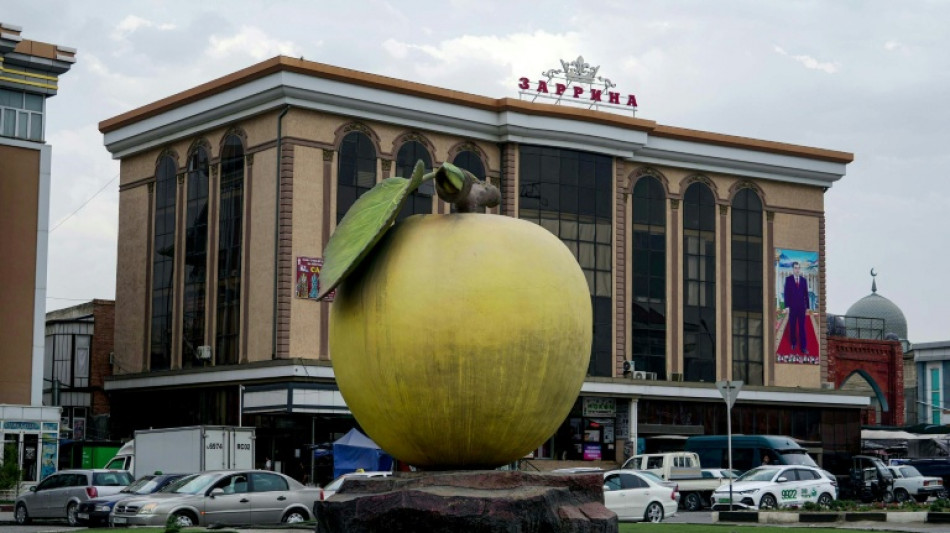
-
 Russian volcano puts on display in latest eruption
Russian volcano puts on display in latest eruption
-
Thailand uses contraceptive vaccine to limit wild elephant births

-
 Djokovic gets lucky to join Pegula, Rybakina in Melbourne semi-finals
Djokovic gets lucky to join Pegula, Rybakina in Melbourne semi-finals
-
Trump says to 'de-escalate' Minneapolis, as aide questions agents' 'protocol'

-
 'Extremely lucky' Djokovic into Melbourne semi-finals as Musetti retires
'Extremely lucky' Djokovic into Melbourne semi-finals as Musetti retires
-
'Animals in a zoo': Players back Gauff call for more privacy

-
 Starmer heads to China to defend 'pragmatic' partnership
Starmer heads to China to defend 'pragmatic' partnership
-
Uganda's Quidditch players with global dreams

-
 'Hard to survive': Kyiv's elderly shiver after Russian attacks on power and heat
'Hard to survive': Kyiv's elderly shiver after Russian attacks on power and heat
-
South Korea's ex-first lady jailed for 20 months for taking bribes

-
 Polish migrants return home to a changed country
Polish migrants return home to a changed country
-
Dutch tech giant ASML posts bumper profits, eyes bright AI future

-
 South Korea's ex-first lady jailed for 20 months for corruption
South Korea's ex-first lady jailed for 20 months for corruption
-
Minnesota congresswoman unbowed after attacked with liquid

-
 Backlash as Australia kills dingoes after backpacker death
Backlash as Australia kills dingoes after backpacker death
-
Brazil declares acai a national fruit to ward off 'biopiracy'

-
 Anisimova 'loses her mind' after Melbourne quarter-final exit
Anisimova 'loses her mind' after Melbourne quarter-final exit
-
Home hope Goggia on medal mission at Milan-Cortina Winter Olympics

-
 Omar attacked in Minneapolis after Trump vows to 'de-escalate'
Omar attacked in Minneapolis after Trump vows to 'de-escalate'
-
Pistons escape Nuggets rally, Thunder roll Pelicans

-
 Dominant Pegula sets up Australian Open semi-final against Rybakina
Dominant Pegula sets up Australian Open semi-final against Rybakina
-
'Animals in a zoo': Swiatek backs Gauff call for more privacy

-
 Japan PM's tax giveaway roils markets and worries voters
Japan PM's tax giveaway roils markets and worries voters
-
Amid Ukraine war fallout, fearful Chechen women seek escape route

-
 Rybakina surges into Melbourne semis as Djokovic takes centre stage
Rybakina surges into Melbourne semis as Djokovic takes centre stage
-
Dollar struggles to recover from losses after Trump comments

-
 Greenland blues to Delhi red carpet: EU finds solace in India
Greenland blues to Delhi red carpet: EU finds solace in India
-
Will the EU ban social media for children in 2026?

-
 Netherlands faces 'test case' climate verdict over Caribbean island
Netherlands faces 'test case' climate verdict over Caribbean island
-
Rybakina stuns Swiatek to reach Australian Open semi-finals

-
 US ouster of Maduro nightmare scenario for Kim: N. Korean ex-diplomat
US ouster of Maduro nightmare scenario for Kim: N. Korean ex-diplomat
-
Svitolina credits mental health break for reaching Melbourne semis

-
 Japan's Olympic ice icons inspire new skating generation
Japan's Olympic ice icons inspire new skating generation
-
Safe nowhere: massacre at Mexico football field sows despair

-
 North Korea to soon unveil 'next-stage' nuclear plans, Kim says
North Korea to soon unveil 'next-stage' nuclear plans, Kim says
-
French ex-senator found guilty of drugging lawmaker

-
 US Fed set to pause rate cuts as it defies Trump pressure
US Fed set to pause rate cuts as it defies Trump pressure
-
Sleeping with one eye open: Venezuelans reel from US strikes

-
 Venezuela's acting president says US unfreezing sanctioned funds
Venezuela's acting president says US unfreezing sanctioned funds
-
KPop Demon Hunters star to open Women's Asian Cup

-
 Trump warns of 'bad things' if Republicans lose midterms
Trump warns of 'bad things' if Republicans lose midterms
-
Russian strikes in Ukraine kill 12, target passenger train

-
 With Maduro gone, Venezuelan opposition figure gets back to work
With Maduro gone, Venezuelan opposition figure gets back to work
-
Celebrities call for action against US immigration raids

-
 Rubio to warn Venezuela leader of Maduro's fate if defiant
Rubio to warn Venezuela leader of Maduro's fate if defiant
-
Denver QB Nix 'predisposed' to ankle injury says coach

-
 Lula, Macron push for stronger UN to face Trump 'Board of Peace'
Lula, Macron push for stronger UN to face Trump 'Board of Peace'
-
Prass stunner helps Hoffenheim go third, Leipzig held at Pauli

-
 Swiss Meillard wins final giant slalom before Olympics
Swiss Meillard wins final giant slalom before Olympics
-
CERN chief upbeat on funding for new particle collider


Tajikistan's apricot farmers grapple with climate change
Tajik apricot farmer Uktam Kuziev is worried about the future now that climate change is threatening Central Asia's vital fruit harvest.
This is one of the world's most exposed regions to the effects of climate change and its poor, rural farming communities are particularly vulnerable.
Kuziev is one of more than 100,000 people employed in Tajikistan's apricot industry, a historic occupation across the mountains and valleys in the north of the landlocked country.
Ten percent of all the world's orchards are located here, according to United Nations data.
But mild winters, melting glaciers, late frosts and water scarcity all pose challenges to cultivation in Tajikistan's apricot capital of Isfara.
"Last year, some land turned desert-like due to lack of water and the soil cracked into pieces," Kuziev told AFP.
"The apricot trees dried up because they weren't watered," the 72-year-old farmer said, standing in front of stubby apricot trees swaying in the wind.
The fruit is "especially vulnerable" to climate change, according to the World Bank, due to "escalating temperatures, shifting precipitation patterns and increased frequency of extreme weather events".
- Water shortages -
At street markets in Isfara, vendors sell buckets of fresh apricots next to piles of glistening red cherries, while on roadsides dried fruits are sold from giant sandbags.
Tajikistan classifies the fruit as a "strategic product" with the UN's Food and Agriculture Organization.
"Apricot cultivation in northern Tajikistan is very important economically and socially... It creates jobs and improves the standard of living of the population," Muminjon Makhmajonov, deputy director of Isfara Food, a major dried fruit producer, told AFP.
So important is the furry orange fruit to the local economy that a giant monument to it has been erected in the middle of Isfara city.
But chronic water shortages and shrinking levels in the Isfara river -- shared by Tajikistan, Uzbekistan and Kyrgyzstan -- are disrupting both the industry and a way of life.
"The effects of climate change and the melting of the glaciers are already being felt. In spring the water level in the Isfara river is low," Bakhtior Jalilov, the city's chief agriculture specialist, told AFP.
Facing water shortages every spring, Kuziev has previously sacrificed wheat crops to "save the essentials -- the apricot trees".
A lack of water is not the only problem faced by farmers.
Paradoxically, bouts of heavy rainfall are also an issue, causing the fruit to grow with thorns or spots on its skin, which reduces its market value.
- Frosts -
"We are sad when it rains a lot because it spoils the product," said Muborak Isoeva, 61, who sells apricots in the neighbouring village of Kulkand.
Drastic temperature swings pose another problem.
The devastation of Turkey's 2025 apricot harvest by cold weather has worried Tajikistan's farmers.
"When the temperature rises or falls sharply, even for a day or two, you won't get the harvest you want," Makhmajonov said.
He buys supplies in the markets around Isfara, where small-scale farmers sell apricots grown in their gardens to make a living.
Whereas before locals had no idea of the concept of a late frost, "over the last 20 years, the trees have frozen over five or six times during or after blooming", city specialist Jalilov said.
- Adaptation -
Producers and the local administration are trying to adapt.
Orchards are being planted more intensively, while some 1,500 hectares of soil on low-yielding plots of land has been regenerated over the last five years.
Some are switching to growing plums, more resilient to the changing climate.
"Unlike apricots, plums bloom a little later and tolerate heat and cold better... so when the apricot harvest is poor, we can still export prunes," said Isfara Food's Makhmajonov.
He has installed a water-efficient drip irrigation system to grow the sweet purple fruit.
But not everybody has that option.
Water fees were hiked 150 percent last year -- something Tajikistan said was necessary to improve infrastructure and balance usage from the river across the three countries.
With an average national salary of just $260 a month, adaptation is both costly and complex for family farmers, who have for decades relied on the fruit to boost their incomes.
"Regardless of their standard of living or social status, if they need money, they could go and sell them at the market," Makhmajonov said.
Climate change is now making that safety net look increasingly fragile.
K.Sutter--VB



